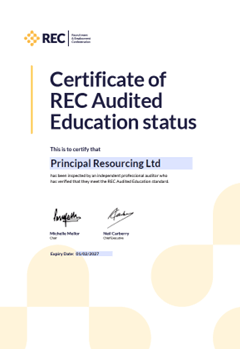If you are looking for a new role in education, a recruiter needs to understand what skills you have and your relevant experience. Schools need to know that new teachers and teaching assistants can provide their students with the best support and education.
Your CV is the door to your new career, and it is essential to make sure you get it right. They always say you never get a second chance to make a first impression and your CV is that opportunity to impress. So, how can you make sure that your CV is going to get you noticed for all the right reasons?
We are here to give you some top tips on making sure your CV helps you have the choice of the best teaching jobs on offer.
5 Tips on CV Writing for Education Careers
Whether you are writing your first CV or if you are updating it after a few years, it is worth looking over our recommendations. Your CV should help prospective employers understand how you can help them and why you are the best person to do that. Spending a few minutes looking at our advice will pay off in the long run, so let’s get into it.
A Strong Personal Statement
Think of your personal statement as a short summary of you and your experience. Give the employer an opportunity to get to know you before they delve deeper into your knowledge. This is your opportunity to be impactful and impress from the word “go”. Mention your enthusiasm for the teaching profession and your commitment to education careers.
Highlight relevant skills and experience
Certain roles will require specific qualifications, so read the job description carefully to ensure you are appropriately qualified. Include all your educational qualifications, Maths, English, etc, but also mention any Health & Safety qualifications or other relevant accreditations.
Do not forget transferrable skills. Think about other skills and experience you have that may be appropriate to the role. Some things aren’t always obvious but may give you that edge over other applicants. It also shows you can apply lateral thinking to your prospective new teaching job.
For example, you may not have worked in a school before, but you might have volunteered with a scouting group. This shows you have supported a large group of children and held a position of responsibility and trust.
Give real-life examples
This may seem obvious, but sometimes people miss out on “selling” themselves. Simply listing your experience isn’t enough. Give real-life examples of how your experience has benefitted you and your previous roles. Showing how you have used your expertise demonstrates how you have applied your knowledge.
Also, use these examples to show how your experience has directly impacted the situation. Did you help improve grades within the class? Did you provide assistance to a large group of students? Maybe you worked alongside students whose first language wasn’t English; how did you help their class involvement?
Tailor your CV for each application
So, you’ve got your CV looking great, that’s it, right? Wrong! If you want your CV to be powerful, you need to ensure that you have adapted it for each specific role. No two jobs are the same, so why would you use the same CV?
Ok, you’ve put a lot of work into figuring out what goes into your CV, so the groundwork is done; you don’t have to start from scratch every time. However, you must think about how each role differs from the last job you applied for.
Take some time to really read the job description and requirements. You may even find that reading the description several times will help. Then, make notes on the key parts of the position, then think about your previous experience and how you can relate to the description. Your previous notes will ensure you cover all the main attributes the role and the school requires.
Attention to detail
It stands to reason that mistakes can seriously affect how you are perceived. Don’t let a minor typing error be why you missed out on your dream role. Whilst this isn’t necessarily going to be a reason for being passed over, don’t give employers any excuse not to interview you.
Focus on your grammar; not only does this show a good level of literacy, but it also indicates your attention to detail.

Applying for teaching vacancies
When you are compiling your CV, you want to make the most of the opportunity of applying for education vacancies. Take the time to ensure that your CV has covered everything you want to say and what the school wants to hear.
Having said that, it is also wise to be concise. With so many people competing for teaching vacancies, schools and recruiters often have a large task to go through multiple CVs. If your CV says everything it needs to in a clear, concise, but informative manner, your CV will be easier to read. If it’s easier to read, employers will likely take more notice.
Principal Resourcing can help you find education vacancies.
As one of the leading education recruiters in Yorkshire and Lincolnshire, Principal Resourcing can help you find the right teaching job. Whether you are a teacher, teaching assistant or cover supervisor, we have vacancies for you.
Once you have crafted your CV, simply send it over to us and we’ll get to work finding your next role in education. Our experts will also offer you advice on your CV and how to make it work for you. If you have anything else, we are always open to questions to improve your chances of finding a position working in education.

